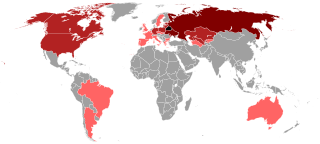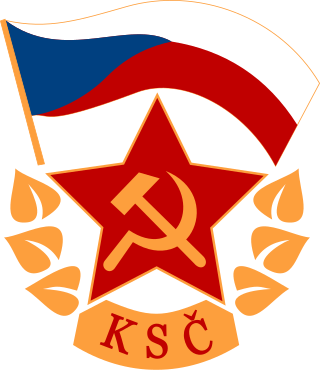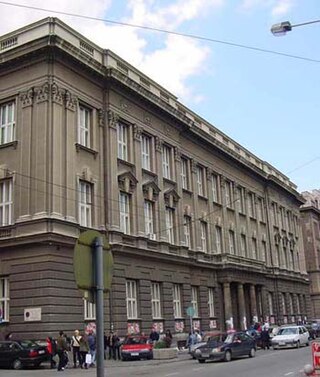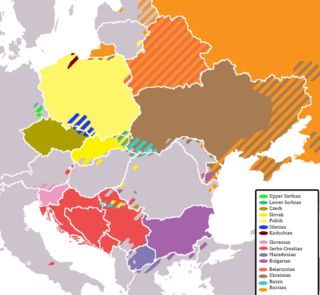
Pan-Slavism, a movement that took shape in the mid-19th century, is the political ideology concerned with promoting integrity and unity for the Slavic people. Its main impact occurred in the Balkans, where non-Slavic empires had ruled the South Slavs for centuries. These were mainly the Byzantine Empire, Austria-Hungary, the Ottoman Empire, and Venice.

Belarusians are an East Slavic ethnic group native to Belarus. More than 9.5 million people proclaim Belarusian ethnicity worldwide. Nearly 8 million Belarusians reside in Belarus, with the United States and Russia being home to more than half a million Belarusians each.

Belarusian is an East Slavic language. It is one of the two official languages in Belarus, alongside Russian. Additionally, it is spoken in some parts of Russia, Lithuania, Latvia, Poland, and Ukraine by Belarusian minorities in those countries.

The Communist Party of Czechoslovakia was a communist and Marxist–Leninist political party in Czechoslovakia that existed between 1921 and 1992. It was a member of the Comintern. Between 1929 and 1953, it was led by Klement Gottwald. The KSČ was the sole governing party in the Czechoslovak Socialist Republic though it was a leading party along with the Slovak branch and four other legally permitted non-communist parties. After its election victory in 1946, it seized power in the 1948 Czechoslovak coup d'état and established a one-party state allied with the Soviet Union. Nationalization of virtually all private enterprises followed, and a command economy was implemented.
ISO 9 is an international standard establishing a system for the transliteration into Latin characters of Cyrillic characters constituting the alphabets of many Slavic and non-Slavic languages.
The term North Slavic languages is used in three main senses:
Studies in Slavic and General Linguistics (SSGL) is an academic book series that was founded in 1980 by A.A. Barentsen, B.M. Groen and R. Sprenger and is published by Rodopi.

Asim Peco was a renowned Bosnian linguist, academician, professor, author and editor.

The Faculty of Philology is one of the constituent schools of the University of Belgrade. The school's purpose is to train and educate its students in the academic study or practice in linguistics and philology.

A pan-Slavic language is a zonal auxiliary language for communication among the Slavic peoples.
The International Council for Central and East European Studies (ICCEES) is an international network of researchers in the field of Russian, Central and East European studies. The ICCEES was founded in 1974, and its chief activities are a biannual newsletter as well as a congress organized every five years, so far in Banff, Garmisch-Partenkirchen, Washington, D.C., Harrogate, WarsawTampere, Berlin and Stockholm.

The first translation into Belarusian was by Francysk Skaryna. He printed his first book titled The Psalter, in the Old Belarusian recension of Church Slavonic on August 6, 1517, in Prague. He continued his printing work in Vilnius. The culmination of his life's work was a printing of the Bible in the Old Belarusian recension of Church Slavonic. From 1517 to 1519 he printed 23 books of the Bible. Belarusian bible was the first translation in an Eastern Slavic language and one of the first among European languages.
The FIMCAP, which is short for Fédération Internationale des Mouvements Catholiques d'Action Paroissiale, is an umbrella organization for Catholic youth organizations. Its 31 member organizations are based in 28 countries. The FIMCAP was founded in 1962 and is recognised as an official Catholic organization by the Dicastery for Laity, Family and Life. FIMCAP is also a full member of the European Youth Forum.
Senahid Halilović was a Bosnian linguist and academician who was a member of the Academy of Sciences and Arts of Bosnia and Herzegovina. Senahid Halilović studied at the University of Belgrade where he acquired his PhD in Dialectology, exploring the East-Bosnian dialect. He published over one hundred professional and scientific papers in the field of dialectology.

The International Romani Union, formerly known as the International Gypsy Committee and International Rom Committee, is an organization active for the rights of the Romani people. Its seat is in Vienna. The International Romani Union also has offices in Skopje, North Macedonia, and Washington, D.C., US.
The Presidium of the National People's Congress of the People's Republic of China is the presiding body of the National People's Congress (NPC) when its in session.

The International Union of Socialist Youth (IUSY) is an international youth labour organization, whose activities include publications, supporting member organizations and organization of meetings. Originally named the Socialist Youth International, the union was formed at the 1907 International Socialist Congress at Stuttgart as the youth wing of the Second International.

Neo-Slavism was a short-lived movement originating in Austria-Hungary around 1908 and influencing nearby Slavic states in the Balkans as well as Russia. Neo-Slavists promoted cooperation between Slavs on equal terms in order to resist Germanization, pursue modernization and liberal reforms, and wanted to create a democratic community of Slavic nations without the dominating influence of Russia.

Ihor Ivanovych Ostash is a Ukrainian diplomat and politician currently serving as ambassador of Ukraine to Lebanon since 2016, previously serving as ambassador of Ukraine to Canada from 2006 to 2011. He also served as a People's Deputy of Ukraine from Lviv Oblast from 1994 to 2006. He is a member of the Reforms and Order Party.
Kiev Slavic University is a private higher education institution in Ukraine at IV level of accreditation, founded in 1993 under the Academy of Sciences as Kiev Institute "Slavic University".












